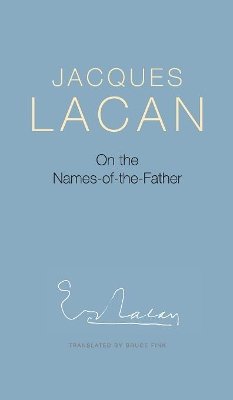
Stock image for illustration purposes only - book cover, edition or condition may vary.
On the Names-of-the-Father
Jacques Lacan
€ 66.36
FREE Delivery in Ireland
Description for On the Names-of-the-Father
Hardcover. What astonishing success the Name-of-the-Father has had! Everyone finds something in it. Who one's father is isn't immediately obvious, hardly being visible to the naked eye. Paternity is first and foremost determined by one's culture. As Lacan said, "The Name-of-the-Father creates the function of the father. Translator(s): Fink, Bruce. Num Pages: 96 pages, 2 illustrations (colour). BIC Classification: JMAF. Category: (P) Professional & Vocational. Dimension: 196 x 126 x 15. Weight in Grams: 194.
What astonishing success the Name-of-the-Father has had! Everyone finds something in it. Who one's father is isn't immediately obvious, hardly being visible to the naked eye. Paternity is first and foremost determined by one's culture. As Lacan said, "The Name-of-the-Father creates the function of the father." But then where does the plural stem from?
It isn't pagan, for it is found in the Bible. He who speaks from the burning bush says of Himself that He doesn't have just one Name. In other words, the Father has no proper Name. It is not a figure of speech, but rather a function. The Father has as many names as the function has props.
What is its function? The religious function par excellence, that of tying things together. What things? The signifier and the signified, law and desire, thought and the body. In short, the symbolic and the imaginary. Yet if these two become tied to the real in a three-part knot, the Name-of-the-Father is no longer anything but mere semblance. On the other hand, if without it everything falls apart, it is the symptom of a failed knotting.
- Jacques-Alain Miller
It isn't pagan, for it is found in the Bible. He who speaks from the burning bush says of Himself that He doesn't have just one Name. In other words, the Father has no proper Name. It is not a figure of speech, but rather a function. The Father has as many names as the function has props.
What is its function? The religious function par excellence, that of tying things together. What things? The signifier and the signified, law and desire, thought and the body. In short, the symbolic and the imaginary. Yet if these two become tied to the real in a three-part knot, the Name-of-the-Father is no longer anything but mere semblance. On the other hand, if without it everything falls apart, it is the symptom of a failed knotting.
- Jacques-Alain Miller
Product Details
Format
Hardback
Publication date
2013
Publisher
Polity Press United Kingdom
Number of pages
96
Condition
New
Number of Pages
96
Place of Publication
Oxford, United Kingdom
ISBN
9780745659916
SKU
V9780745659916
Shipping Time
Usually ships in 7 to 11 working days
Ref
99-50
About Jacques Lacan
Jacques Lacan (1901–1981) was one of the twentieth century’s most influential thinkers. His many works include Écrits, The Four Fundamental Concepts of Psycho-analysis and the many other volumes of The Seminars.
Reviews for On the Names-of-the-Father
What astonishing success the Name-of-the-Father has had! Everyone finds something in it. Who one’s father is isn’t immediately obvious, hardly being visible to the naked eye. Paternity is determined first and foremost by one’s culture. As Lacan said, "the Name-of-the-Father creates the function of the father." But then where does the plural stem from? It isn’t pagan, for it is found in the Bible. He who speaks from the burning bush says of Himself that He doesn't have just one Name. In other words, the Father has no proper Name. It is not a figure of speech, but rather a function. The Father has as many names as the function has props. What is its function? The religious function par excellence, that of tying things together. What things? The signifier and the signified, law and desire, thought and the body. In short, the symbolic and the imaginary. Yet if these two become tied to the real in a three-part knot, the Name-of-the-Father is no longer anything but mere semblance. On the other hand, if without it everything falls apart, it is the symptom of a failed knotting. Jacques-Alain Miller
